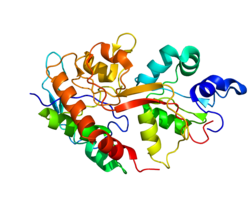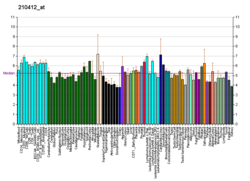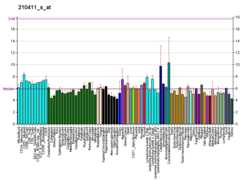NR2B
Glutamate [NMDA] receptor subunit epsilon-2, also known as N-methyl D-aspartate receptor subtype 2B (NMDAR2B or NR2B), is a protein that in humans is encoded by the GRIN2B gene.
N-methyl-D-aspartate (NMDA) receptors are a class of ionotropic glutamate receptors. The NMDA receptor channel has been shown to be involved in long-term potentiation, an activity-dependent increase in the efficiency of synaptic transmission thought to underlie certain kinds of memory and learning. NMDA receptor channels are heterotetramers composed of two molecules of the key receptor subunit NMDAR1 (GRIN1) and two drawn from one or more of the four NMDAR2 subunits: NMDAR2A (GRIN2A), NMDAR2B (GRIN2B), NMDAR2C (GRIN2C), and NMDAR2D (GRIN2D). The NR2 subunit acts as the agonist binding site for glutamate, one of the predominant excitatory neurotransmitter receptors in the mammalian brain.
...
Wikipedia



